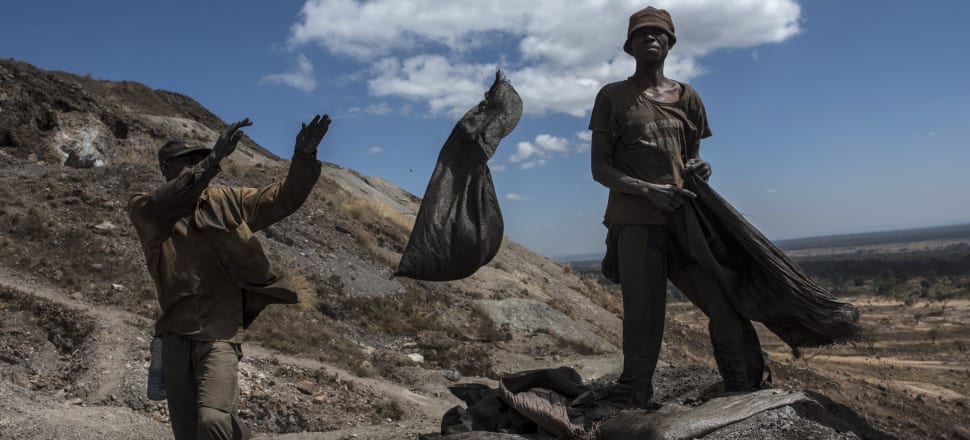
Providing transparency is vital so people can make informed buying choices, and battery producers can end abusive mining practices.
Large batteries, like the ones used in EVs or energy storage, not only represent an opportunity to shift away from fossil fuels, but to build more ethical and sustainable practices into global energy systems.
A key way to achieving this is battery passports.
Child labour, carbon footprint and other environmental impacts from mining and processing the raw materials to make the batteries are issues the public is increasingly concerned about. The way minerals like, cobalt and lithium are mined are particular sources of concern.
READ MORE: * Viva la EV-lution – Dunedin firm does its bit one ute at a time * NZ Takes Stand On Ethical Dilemma For EV Buyers * A Two-Tonne Electric Battery And A Pie To Go * EVs: Don't Mistake A Speed Bump For A Roadblock * Taupō firm plans plant to process lithium for EV batteries
A report released this month by New York University and the University of Geneva says large companies using cobalt mined in the Democratic Republic of Congo need to act with urgency to tackle child labour and human rights violations around cobalt mining in small-scale, ‘artisanal mines’.
Some, such as Harvard's TH Chan School of Public Health fellow Siddharth Kara, who has been studying human trafficking and child labour for two decades, goes so far as to say says there is no “clean” supply chain of cobalt from the Congo. Estimates for how much of the world’s cobalt comes from the Congo ranges from 50 to 80 percent.
The environmental damage which lithium mining can have has been widely reported, particularly in South America. In these cases ground water has been exploited or poisoned by unscrupulous miners and processors, causing ecological and human harm.
Providing transparency around these issues is vital so people can make informed buying choices, and battery producers can take the action needed to end abusive mining practices.
In January this year the Global Battery Alliance launched the proof of concept for its battery passport at the World Economic Forum’s annual meeting. The passport works as a battery’s “digital twin,” tracking its journey from raw materials to finished product, creating an impressive level of transparency and surety for investors, industry and consumers.
According to the Global Battery Alliance, the passport collates and tracks information on where raw materials, like cobalt, lithium, and graphite are mined, as well as technical specifications, information on the battery’s carbon footprint, and its child labour and human rights performance.
The Alliance’s members range from mining companies to major international battery manufacturers and automotive companies, to recyclers.
The role the passports have in tracking information is vital. Transitioning away from fossil fuels can’t just be about reducing carbon emissions, it must be equitable and have much further reaching, positive impacts across the supply chain. This is especially important for communities and their environment, often in developing nations, where raw materials are mined or processed.
If we want to reduce the environmental impact of batteries and make them an affordable alternative, then reuse and recycling must be a big part of the conversation. Battery passports are a vital part of this.
A battery’s end of life undoubtedly presents challenges. Many current lithium-ion batteries are built in a way which makes them difficult and expensive to take apart and recycle due to their complexity and the toxic materials they contain.
A battery passport has an important role to play here too, with developers planning for future iterations to include technical information for disassembly and recycling. I hope to see this push battery sustainability back up the pipeline to the design stage as those made to be easily taken apart and recycled become more favoured by suppliers.
Reusing EV batteries for energy storage is an excellent way of extending its life, with a battery passport giving greater certainty to the next user on its condition and the life it’s lived so far.
In New Zealand, as part of the work towards a product stewardship scheme for large batteries, The Power Trip has produced a report showing how battery state of health could be published to a battery passport.
This would give companies such as Dunedin’s Control Focus, that are already repurposing EV batteries for use in solar systems, certainty about battery origins and state of health.
There is a big economic driver for reuse and recycling. The demand for raw materials has increased significantly over past few years and is only projected to continue rising. As a result, end of life batteries are becoming a valuable commodity.
The idea for a passport has already been endorsed at the 2021 G7 Leaders’ Meeting, and in the European Union Battery Regulation. According to the GBA battery passports will become mandatory in the EU by 2026 and other regions will undoubtedly follow.
The New Zealand market is led by the large markets, such as in the EU, so we can absolutely expect to see this have an impact in Aotearoa.







